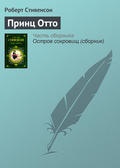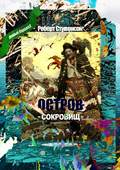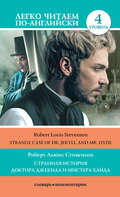
Роберт Льюис Стивенсон
Английская коллекция. Р. Л. Стивенсон. Бутылочный чертенок / Robert Louis Stevenson. The Bottle Imp
dear [dɪǝ], returned [rɪ'tɜ:nd], comfort ['kʌmfǝt]
“Dear me, you must not run away with things,” returned the man. “All you have to do is to use the power of the imp in moderation, and then sell it to someone else, as I do to you, and finish your life in comfort.”
“Well, I observe two things (что ж, я вижу две вещи; to observe – наблюдать, следить /за чем-л./; замечать),” said Keawe. “All the time you keep sighing like a maid in love, that is one (все время вы продолжаете вздыхать, словно влюбленная девушка, это первое; to keep – держать, хранить; to keep doing smth. – продолжать делать что-л.); and, for the other, you sell this bottle very cheap (и, что касается второго, вы продаете эту бутылку очень дешево; other – еще один, другой; второй, другой из двух или трех/).”
“I have told you already why I sigh (я уже сказал вам, почему я вздыхаю),” said the man. “It is because I fear my health is breaking up (это из-за того, что я боюсь, что мое здоровье слабеет; to break up – расформировывать, разгонять /толпу и т. п./; /разг./ слабеть, терять силы); and, as you said yourself, to die and go to the devil is a pity for anyone (и, как вы сами же сказали, умереть и отправиться к дьяволу – это прискорбное /событие/ для любого; pity – жалость, сострадание; печальный факт, факт, достойный сожаления).
observe [ǝb'zɜ:v], health [helθ], pity ['pɪtɪ]
“Well, I observe two things,” said Keawe. “All the time you keep sighing like a maid in love, that is one; and, for the other, you sell this bottle very cheap.”
“I have told you already why I sigh,” said the man. “It is because I fear my health is breaking up; and, as you said yourself, to die and go to the devil is a pity for anyone.
As for why I sell so cheap (что касается того, почему я продаю /бутылку/ так дешево), I must explain to you there is a peculiarity about the bottle (я должен объяснить вам, что есть одна особенность у этой бутылки). Long ago, when the devil brought it first upon earth (давным-давно, когда дьявол впервые принес ее на землю; to bring), it was extremely expensive (она была чрезвычайно дорогой), and was sold first of all to Prester John for many millions of dollars (и /она/ была продана в самый первый раз пресвитеру Иоанну за многие миллионы долларов; to sell); but it cannot be sold at all, unless sold at a loss (но ее вовсе невозможно продать, кроме как продать с убытком; loss – потеря, лишение; ущерб, урон, убыток). If you sell it for as much as you paid for it (если вы продадите ее за столько же, сколько вы заплатили за нее; to pay), back it comes to you again like a homing pigeon (она снова возвращается к вам, словно почтовый голубь; homing – возвращающийся, направляющийся домой, обратно; pigeon – голубь; homing pigeon – почтовый голубь).
peculiarity [pɪ,kju:lɪ'ærǝtɪ], brought [brɔ:t], pigeon ['pɪdʒǝn]
As for why I sell so cheap, I must explain to you there is a peculiarity about the bottle. Long ago, when the devil brought it first upon earth, it was extremely expensive, and was sold first of all to Prester John for many millions of dollars; but it cannot be sold at all, unless sold at a loss. If you sell it for as much as you paid for it, back it comes to you again like a homing pigeon.
It follows that the price has kept falling in these centuries (следовательно, цена продолжала снижаться: «падать» за столетия; to follow – следовать, идти /за кем-л., чем-л./; следовать, логически вытекать, явствовать), and the bottle is now remarkably cheap (и теперь бутылка удивительно дешева). I bought it myself from one of my great neighbours on this hill (я сам купил ее у одного из моих влиятельных соседей с этого холма; to buy; great – большой, огромный; крупный, значительный), and the price I paid was only ninety dollars (и цена, которую я заплатил, составляла всего девяносто долларов). I could sell it for as high as eighty-nine dollars and ninety-nine cents, but not a penny dearer (я мог бы продать ее за самое большее восемьдесят девять долларов и девяносто девять центов – и ни пенни дороже; high – высокий; дорогой), or back the thing must come to me (или эта штуковина должна вернуться обратно ко мне).
centuries ['sentʃ(ǝ)rɪz], neighbours ['neɪbǝz], dearer ['dɪǝrǝ]
It follows that the price has kept falling in these centuries, and the bottle is now remarkably cheap. I bought it myself from one of my great neighbours on this hill, and the price I paid was only ninety dollars. I could sell it for as high as eighty-nine dollars and ninety-nine cents, but not a penny dearer, or back the thing must come to me.
Now, about this there are two bothers (так вот, из-за этого возникают две трудности: «существуют две /причины для/ беспокойства»). First, when you offer a bottle so singular for eighty odd dollars (во-первых, когда предлагаешь такую необыкновенную бутылку за восемьдесят с лишним долларов; odd – нечетный; превышающий /круглое число/), people suppose you to be jesting (люди полагают, что ты шутишь). And second (и во-вторых) – but there is no hurry about that (но это не к спеху) – and I need not go into it (вряд ли мне стоит вдаваться в это; to go into smth. – налететь /на что-л./ с силой; to go into detail – вдаваться в подробности, вдаваться в детали). Only remember it must be coined money that you sell it for (только запомните, что вы должны продать ее за чеканные монеты: «это должны быть чеканные деньги, за которые вы ее продадите»).”
bother ['bɒðǝ], singular ['sɪŋɡjǝlǝ], jesting ['dʒestɪŋ]
Now, about this there are two bothers. First, when you offer a bottle so singular for eighty odd dollars, people suppose you to be jesting. And second – but there is no hurry about that – and I need not go into it. Only remember it must be coined money that you sell it for.”
“How am I to know that this is all true (откуда мне знать, что все это правда)?” asked Keawe (спросил Кэаве).
“Some of it you can try at once (кое-что вы можете попробовать сейчас же),” replied the man (ответил мужчина). “Give me your fifty dollars (дайте мне ваши пятьдесят долларов), take the bottle (возьмите бутылку), and wish your fifty dollars back into your pocket (и пожелайте, чтобы ваши пятьдесят долларов вернулись в ваш карман). If that does not happen, I pledge you my honour (если этого не случится, я даю слово: «ручаюсь своей честью»; to pledge – закладывать, отдавать в залог; ручаться) I will cry off the bargain and restore your money (я откажусь от сделки и возвращу ваши деньги; to cry off – отказаться от обещания/; отказаться от сделки).”
“You are not deceiving me (вы меня не обманываете)?” said Keawe.
The man bound himself with a great oath (мужчина торжественно поклялся, /что говорит правду/: «связал себя торжественной клятвой»; to bind – вязать, связывать; обязаться, связать себя договором; great – большой, огромный; главный, важный).
true [tru:], honour ['ɒnǝ], bargain ['bɑ:ɡɪn], oath [ǝʋθ]
“How am I to know that this is all true?” asked Keawe.
“Some of it you can try at once,” replied the man. “Give me your fifty dollars, take the bottle, and wish your fifty dollars back into your pocket. If that does not happen, I pledge you my honour I will cry off the bargain and restore your money.”
“You are not deceiving me?” said Keawe.
The man bound himself with a great oath.
“Well, I will risk that much (что ж, этим я рискну; much – очень; that much – столько; столько-то, это-то, хоть это),” said Keawe, “for that can do no harm (потому что это не причинит вреда: «не может причинить никакого вреда»).” And he paid over his money to the man (и он выплатил деньги этому мужчине), and the man handed him the bottle (а мужчина вручил ему бутылку; hand – рука, кисть руки; to hand – передавать, вручать).
“Imp of the bottle (чертенок из бутылки),” said Keawe, “I want my fifty dollars back (я хочу обратно свои = верни мне мои пятьдесят долларов; back – сзади, позади; обратно, назад).”
And sure enough he had scarce said the word (и действительно, едва он произнес эти слова; word – слово; речь, разговор, слова) before his pocket was as heavy as ever (как его карман стал таким же тяжелым, как и прежде).
“To be sure this is a wonderful bottle (конечно, это удивительная бутылка),” said Keawe.
money ['mʌnɪ], enough [ɪ'nʌf], scarce [skeǝs]
“Well, I will risk that much,” said Keawe, “for that can do no harm.” And he paid over his money to the man, and the man handed him the bottle.
“Imp of the bottle,” said Keawe, “I want my fifty dollars back.”
And sure enough he had scarce said the word before his pocket was as heavy as ever.
“To be sure this is a wonderful bottle,” said Keawe.
“And now good-morning to you, my fine fellow (а теперь прощайте, дружище: «доброго вам утра, славный малый»), and the devil go with you for me (и черт с вами: «дьявол ступай с вами от меня»)!” said the man.
“Hold on (подождите-ка; to hold on – держаться, вцепиться /во что-л./; подождать /делать что-л./),” said Keawe, “I don't want any more of this fun (мне больше таких шуток не нужно: «я не хочу больше из таких забав»). Here, take your bottle back (вот, забирайте назад свою бутылку).”
now [naʋ], fellow ['felǝʋ], more [mɔ:]
“And now good-morning to you, my fine fellow, and the devil go with you for me!” said the man.
“Hold on,” said Keawe, “I don't want any more of this fun. Here, take your bottle back.”
“You have bought it for less than I paid for it (вы купили ее за меньшие /деньги/, чем я заплатил за нее),” replied the man, rubbing his hands (ответил мужчина, потирая руки). “It is yours now (теперь она ваша); and, for my part, I am only concerned to see the back of you (и, что касается меня: «со своей стороны», меня волнует только, как бы от вас избавиться: «как бы увидеть вашу спину»; part – часть, доля; сторона; to concern – касаться /в рассказе/, описывать; беспокоить, волновать, заботить; back – спина; to see smb.'s back – видеть чей-л. уход; избавиться, отделаться от кого-л.).”
And with that he rang for his Chinese servant (и с этими словами он позвал своего слугу-китайца; to ring for – требовать, вызывать звонком), and had Keawe shown out of the house (и приказал вывести Кэаве из дома; to have smth. done – велеть, приказать сделать что-л. для себя; to show out – проводить, вывести /из комнаты и т. п./).
yours [jɔ:z], concerned [kǝn'sɜ:nd], Chinese [,tʃaɪ'ni:z], servant ['sɜ:v(ǝ)nt]
“You have bought it for less than I paid for it,” replied the man, rubbing his hands. “It is yours now; and, for my part, I am only concerned to see the back of you.”
And with that he rang for his Chinese servant, and had Keawe shown out of the house.
Now, when Keawe was in the street, with the bottle under his arm (теперь, когда Кэаве оказался на улице с бутылкой под мышкой; arm – рука /от плеча до кисти/), he began to think (он задумался: «начал думать»; to begin).
“If all is true about this bottle (если все /сказанное/ об этой бутылке – правда), I may have made a losing bargain (то я, возможно, заключил невыгодную сделку; to lose – терять; нести потери, убыток; losing – проигрышный),” thinks he. “But perhaps the man was only fooling me (но, может быть, этот человек просто дурачил меня; fool – дурак, глупец; to fool – дурачиться, баловаться; дурачить, обманывать /кого-л./).” The first thing he did was to count his money (первым делом он пересчитал свои деньги); the sum was exact – forty-nine dollars American money, and one Chili piece (сумма была верной: «точной»: сорок девять американских долларов: «американскими деньгами» и одна чилийская монета; piece – кусок, часть; монета).
“That looks like the truth (похоже на правду; to look – смотреть, глядеть; to look like smth. – быть похожим, напоминать что-л.),” said Keawe. “Now I will try another part (а теперь я испробую вот что: «другую часть /особенностей бутылки/»).”
losing ['lu:zɪŋ], perhaps [pǝ'hæps; præps], exact [ɪɡ'zækt]
Now, when Keawe was in the street, with the bottle under his arm, he began to think.
“If all is true about this bottle, I may have made a losing bargain,” thinks he. “But perhaps the man was only fooling me.” The first thing he did was to count his money; the sum was exact – forty-nine dollars American money, and one Chili piece.
“That looks like the truth,” said Keawe. “Now I will try another part.”
The streets in that part of the city were as clean as a ship's decks (улицы в той части города были чистыми, словно палубы корабля), and though it was noon, there were no passengers (и, хотя был полдень, там = на них не было /никаких/ прохожих; passenger – пассажир, седок; путник, странник).
Keawe set the bottle in the gutter and walked away (Кэаве бросил: «положил» бутылку в канаву и зашагал прочь). Twice he looked back (дважды он оглянулся: «посмотрел назад»), and there was the milky, round-bellied bottle where he left it (и по-прежнему молочного /цвета/ пузатая бутылка была там, где он ее оставил; to leave).
though [ðǝʋ], gutter ['ɡʌtǝ], round-bellied ['raʋnd,belɪd]
The streets in that part of the city were as clean as a ship's decks, and though it was noon, there were no passengers.
Keawe set the bottle in the gutter and walked away. Twice he looked back, and there was the milky, round-bellied bottle where he left it.
A third time he looked back, and turned a corner (в третий раз он оглянулся и повернул за угол); but he had scarce done so, when something knocked upon his elbow (но едва он повернул: «сделал так», как что-то ударило его по локтю; to knock – стучать, постучаться; ударять, бить), and behold! it was the long neck sticking up (и, гляди-ка! это было длинное торчащее горлышко; neck – шея; горлышко /бутылки/; to stick up – поставить; поднимать, задирать); and as for the round belly, it was jammed into the pocket of his pilot-coat (а что до самой пузатой бутылки: «круглого живота», она была засунута в карман его бушлата; to jam – сжимать, зажимать; впихивать, втискивать; pilot – летчик, пилот; /мор./ лоцман; coat – пиджак, мундир, китель; pilot-coat = pea jacket – бушлат).
“And that looks like the truth (и это похоже на правду),” said Keawe.
third [θɜ:d], jammed [dʒæmd], pilot coat ['paɪlǝt,kǝʋt]
A third time he looked back, and turned a corner; but he had scarce done so, when something knocked upon his elbow, and behold! it was the long neck sticking up; and as for the round belly, it was jammed into the pocket of his pilot-coat.
“And that looks like the truth,” said Keawe.
The next thing he did was to buy a cork-screw in a shop (следующим делом он купил штопор в магазине: «следующее дело, которое он сделал, это купил штопор в магазине»; cork – кора пробкового дерева; пробка; screw – винт, шуруп; cork-screw – штопор /для открывания бутылок/), and go apart into a secret place in the fields (и ушел в безлюдное поле: «уединенное место в полях»; secret – тайный, секретный; уединенный, удаленный).
And there he tried to draw the cork (и там он попытался вытащить пробку), but as often as he put the screw in, out it came again (но каждый раз, когда он ввинчивал штопор, он снова оказывался снаружи; often – часто, много раз; as often as – всякий раз, как только; to come out – появляться; выпадать, вылезать), and the cork as whole as ever (а пробка /оставалась/ как никогда целехонькой; whole – весь, целый, полный; неповрежденный, целый /о неодушевленных предметах/).
“This is some new sort of cork (это какой-то новый сорт пробки),” said Keawe, and all at once he began to shake and sweat (сказал Кэаве, и неожиданно его затрясло, и он покрылся испариной: «он начал трястись и потеть»; to shake – трясти; дрожать, трястись), for he was afraid of that bottle (потому что он испугался той бутылки).
cork-screw ['kɔ:kskru:], sweat [swet], afraid [ǝ'freɪd]
The next thing he did was to buy a cork-screw in a shop, and go apart into a secret place in the fields.
And there he tried to draw the cork, but as often as he put the screw in, out it came again, and the cork as whole as ever.
“This is some new sort of cork,” said Keawe, and all at once he began to shake and sweat, for he was afraid of that bottle.
On his way back to the port-side, he saw a shop (по пути назад, в порт, он увидел лавку; port-side – береговая линия /в порту, гавани/) where a man sold shells and clubs from the wild islands (где какой-то человек продавал раковины и дубинки с девственных островов; to sell; wild – дикий, дикорастущий; девственный, дикий /о местности/), old heathen deities (старых языческих божков), old coined money (старинные монеты: «чеканные деньги»; coin – монета; to coin – чеканить /монету/), pictures from China and Japan (рисунки из Китая и Японии), and all manner of things that sailors bring in their sea-chests (и всякого рода вещи, которые моряки привозят в своих матросских сундучках; manner – метод, способ; сорт, род; sea – море, океан).
And here he had an idea (и тут ему пришла в голову: «у него появилась» одна идея). So he went in and offered the bottle for a hundred dollars (тогда он вошел /в лавку/ и предложил бутылку за сотню долларов; to go in).
heathen ['hi:ð(ǝ)n], deities ['di:ɪtɪz], Japan [dʒǝ'pæn]
On his way back to the port-side, he saw a shop where a man sold shells and clubs from the wild islands, old heathen deities, old coined money, pictures from China and Japan, and all manner of things that sailors bring in their sea-chests.
And here he had an idea. So he went in and offered the bottle for a hundred dollars.
The man of the shop laughed at him at the first, and offered him five (хозяин лавки посмеялся над ним сперва и предложил ему пять; man – мужчина, человек); but, indeed, it was a curious bottle (но, в самом деле, это была удивительная бутылка; curious – любознательный, пытливый; изящный, изысканный) – such glass was never blown in any human glassworks (такого стекла никогда не выдували ни в одной из человеческих мастерских; to blow – дуть, веять /о ветре/; выдувать /стеклянные изделия и т. п./; glass – стекло; works – завод, фабрика, мастерские; glassworks – стекольное производство, стекольный завод), so prettily the colours shone under the milky white (так изящно сияли цвета /в толще стекла/ под молочной белизной; to shine), and so strangely the shadow hovered in the midst (и настолько необычно трепетала тень внутри: «в середине»; to hover – реять, парить, порхать /о птице и т. п./); so, after he had disputed awhile after the manner of his kind (так что, поторговавшись какое-то время, как это свойственно торговцам: «на манер ему подобных»; to dispute – обсуждать, дискутировать; спорить, пререкаться; manner – метод, способ, образ действий; after the manner of smb. – на манер, наподобие кого-л.; kind – сорт, класс; /арх./ манера, способ /присущий кому-л./), the shop-man gave Keawe sixty silver dollars for the thing (торговец дал Кэаве шестьдесят серебряных долларов за эту вещь; to give), and set it on a shelf in the midst of his window (и поместил ее на полку в середине витрины; to set; window – окно; витрина).
curious ['kjʋǝrɪǝs], shadow ['ʃædǝʋ], dispute [dɪs'pju:t]
The man of the shop laughed at him at the first, and offered him five; but, indeed, it was a curious bottle – such glass was never blown in any human glassworks, so prettily the colours shone under the milky white, and so strangely the shadow hovered in the midst; so, after he had disputed awhile after the manner of his kind, the shop-man gave Keawe sixty silver dollars for the thing, and set it on a shelf in the midst of his window.
“Now (так вот),” said Keawe, “I have sold that for sixty which I bought for fifty (я продал ее за шестьдесят, /хотя/ я купил ее за пятьдесят: «я продал то за шестьдесят, что купил за пятьдесят») – or, to say truth, a little less, because one of my dollars was from Chili (или, сказать по правде, немногим меньше, потому что один из моих долларов был чилийским: «из Чили»). Now I shall know the truth upon another point (теперь я узнаю правду о другой особенности /этой бутылки/: «другом аспекте»; point – точка; пункт, момент).”
So he went back on board his ship (так что он вернулся на свой корабль: «пошел назад на борт своего корабля»; to go back; board – доска; борт /корабля/), and, when he opened his chest, there was the bottle (и когда он открыл свой сундук, в нем лежала: «там была» бутылка), and had come more quickly than himself (и добралась она /сюда/ быстрее, чем он сам).
Now Keawe had a mate on board whose name was Lopaka (так вот, у Кэаве был товарищ на корабле, которого звали: «чье имя было» Лопака).
because [bɪ'kɒz], Chili ['tʃɪlɪ], board [bɔ:d]
“Now,” said Keawe, “I have sold that for sixty which I bought for fifty – or, to say truth, a little less, because one of my dollars was from Chili. Now I shall know the truth upon another point.”
So he went back on board his ship, and, when he opened his chest, there was the bottle, and had come more quickly than himself.
Now Keawe had a mate on board whose name was Lopaka.
“What ails you (что тебя гнетет; to ail – хворать, чувствовать недомогание; беспокоить, мучить, томить)?” said Lopaka, “that you stare in your chest (раз ты уставился в свой сундук)?”
They were alone in the ship's forecastle (они были одни в носовом кубрике корабля), and Keawe bound him to secrecy, and told all (и Кэаве, заставив того поклясться не болтать: «обязал к секретности», рассказал ему все; to bind – связывать; обязывать).
ails [eɪlz], forecastle ['fǝʋks(ǝ)l], secrecy ['si:krǝsɪ]
“What ails you?” said Lopaka, “that you stare in your chest?”
They were alone in the ship's forecastle, and Keawe bound him to secrecy, and told all.
“This is a very strange affair (это очень странное дело; strange – незнакомый, неизвестный; странный, необычный, чудной),” said Lopaka; “and I fear you will be in trouble about this bottle (и я боюсь, что ты попадешь в беду из-за этой бутылки; trouble – беспокойство, волнение; неприятность, беда, напасть). But there is one point very clear (но есть один очень ясный момент = одно несомненно; clear – ясный, светлый; ясный, понятный, не вызывающий сомнений) – that you are sure of the trouble (что ты знаешь об этой беде; sure – уверенный, убежденный), and you had better have the profit in the bargain (и тебе бы лучше = тебе бы не помешало извлечь прибыль из этой сделки; profit – польза, выгода; прибыль, доход). Make up your mind what you want with it (реши, что ты хочешь от нее; to make up one's mind – принять решение, решиться /на что-л. или сделать что-л./); give the order (отдай приказ), and if it is done as you desire (и, если он будет исполнен так, как ты желаешь), I will buy the bottle myself (я сам куплю эту бутылку); for I have an idea of my own to get a schooner, and go trading through the islands (потому что у меня есть и свой собственный план – заполучить шхуну и торговать на островах; idea – идея, мысль; план, намерение, замысел; own – собственность, принадлежность; to get – доставать, добывать; получать; покупать, приобретать; to go doing smth. – заниматься чем-л.).”
affair [ǝ'feǝ], schooner ['sku:nǝ], through [θru:]
“This is a very strange affair,” said Lopaka; “and I fear you will be in trouble about this bottle. But there is one point very clear – that you are sure of the trouble, and you had better have the profit in the bargain. Make up your mind what you want with it; give the order, and if it is done as you desire, I will buy the bottle myself; for I have an idea of my own to get a schooner, and go trading through the islands.”
“That is not my idea (это не для меня: «это не мой замысел»),” said Keawe; “but to have a beautiful house and garden on the Kona Coast, where I was born (а /вот по мне/ иметь красивый дом с садом: «и сад» на побережье Кона, где я родился; to bear – переносить, перевозить; рождать, производить на свет), the sun shining in at the door (/и чтобы/ солнце светило в /окна/ у входа: «у двери»), flowers in the garden (и цветы в саду /цвели/), glass in the windows (/и чтобы/ в окнах /были/ стекла), pictures on the walls (/и чтобы/ картины /были/ на стенах), and toys and fine carpets on the tables (и безделушки, и красивые скатерти на столах; toy – /детская/ игрушка; безделушка, пустяк; carpet – ковер; покрытие), for all the world like the house I was in this day (/словом, чтобы он был/ похож во всех отношениях на тот дом, в котором я был сегодня; world – мир, свет, земной шар; /эмоц. – усил/ крайне, чрезвычайно) – only a storey higher (только на один этаж повыше), and with balconies all about like the King's palace (и с балконами со всех сторон, как у королевского дворца); and to live there without care and make merry with my friends and relatives (и чтобы жить там без забот и веселиться со своими друзьями и родственниками; care – забота, попечение; забота, тревога; merry – веселый, радостный; праздничный; to make merry – веселиться, пировать).”
picture ['pɪktʃǝ], carpet ['kɑ:pɪt], storey ['stɔ:rɪ], balconies ['bælkǝnɪz]
“That is not my idea,” said Keawe; “but to have a beautiful house and garden on the Kona Coast, where I was born, the sun shining in at the door, flowers in the garden, glass in the windows, pictures on the walls, and toys and fine carpets on the tables, for all the world like the house I was in this day – only a storey higher, and with balconies all about like the King's palace; and to live there without care and make merry with my friends and relatives.”
“Well (что ж),” said Lopaka, “let us carry it back with us to Hawaii (давай увезем ее с собой на Гавайи; back – сзади, позади; обратно, назад); and if all comes true, as you suppose (и если все сбудется: «станет верным», как ты предполагаешь; to come true – сбываться /о мечтах, предсказаниях/), I will buy the bottle, as I said, and ask a schooner (то я куплю бутылку и, как я уже сказал, попрошу шхуну; to ask – спрашивать; просить).”
Upon that they were agreed (на том они и сговорились; to agree – соглашаться; уславливаться, договариваться), and it was not long before the ship returned to Honolulu (и вскоре: «и это было незадолго до того, как» корабль возвратился в Гонолулу), carrying Keawe and Lopaka, and the bottle (и привез и Кэаве, и Лопаку, и бутылку; to carry – нести, носить; возить, перевозить).
They were scarce come ashore when they met a friend upon the beach (едва они сошли на берег, как они повстречали одного знакомого на берегу; to come; to meet; friend – друг; знакомый), who began at once to condole with Keawe (который немедленно начал выражать Кэаве соболезнования; to condole – сочувствовать, сострадать, выражать соболезнование, сочувствие).
carry ['kærɪ], ashore [ǝ'ʃɔ:], friend [frend], condole [kǝn'dǝʋl]
“Well,” said Lopaka, “let us carry it back with us to Hawaii; and if all comes true, as you suppose, I will buy the bottle, as I said, and ask a schooner.”
Upon that they were agreed, and it was not long before the ship returned to Honolulu, carrying Keawe and Lopaka, and the bottle.
They were scarce come ashore when they met a friend upon the beach, who began at once to condole with Keawe.
“I do not know what I am to be condoled about (я понятия не имею, по какому случаю мне выражают соболезнования; to know – знать, иметь понятие, быть в курсе дела),” said Keawe.
“Is it possible you have not heard (разве ты не знаешь: «возможно ли, что ты ничего не слышал»; to hear – слышать; услышать, узнать),” said the friend, “your uncle – that good old man – is dead (твой дядя, славный такой старик: «старый добрый человек», умер), and your cousin – that beautiful boy – was drowned at sea (а твой двоюродный брат, красивый такой юноша, утонул в море; boy – мальчик; /разг./ человек, малый, парень)?”
Keawe was filled with sorrow (Кэаве опечалился: «был наполнен скорбью»), and, beginning to weep and to lament (и начал плакать и стенать), he forgot about the bottle (и позабыл про бутылку; to forget).
But Lopaka was thinking to himself (но Лопака /продолжал/ раздумывать: «думать про себя»), and presently, when Keawe's grief was a little abated (и вскоре, когда скорбь Кэаве немного притупилась), “I have been thinking (я тут подумал),” said Lopaka. “Had not your uncle lands in Hawaii, in the district of Kau (а не было ли у твоего дяди земель на Гавайях, в районе Кау; land – земля, суша; земельный участок)?”
heard [hɜ:d], drowned [draʋnd], sorrow ['sɒrǝʋ], abated [ǝ'beɪtɪd]
“I do not know what I am to be condoled about,” said Keawe.
“Is it possible you have not heard,” said the friend, “your uncle – that good old man – is dead, and your cousin – that beautiful boy – was drowned at sea?”
Keawe was filled with sorrow, and, beginning to weep and to lament, he forgot about the bottle.
But Lopaka was thinking to himself, and presently, when Keawe's grief was a little abated, “I have been thinking,” said Lopaka. “Had not your uncle lands in Hawaii, in the district of Kau?”
“No,” said Keawe, “not in Kau (не в Кау = в Кау не было); they are on the mountain-side – a little way south of Hookena (они находятся на горном склоне, немного к югу от Хукены; mountain – гора; side – сторона; склон; mountain-side – горный скат, склон; way – путь, дорога; расстояние).”
“These lands will now be yours (а эти земли теперь /не/ твоими ли будут)?” asked Lopaka (спросил Лопака).
“And so they will (да, так и будет: «такими они и будут»),” says Keawe, and began again to lament for his relatives (сказал Кэаве и снова начал оплакивать своих родственников).
mountain ['maʋntɪn], south [saʋθ], lament [lǝ'ment], relatives ['relǝtɪvz]
“No,” said Keawe, “not in Kau; they are on the mountain-side – a little way south of Hookena.”
“These lands will now be yours?” asked Lopaka.
“And so they will,” says Keawe, and began again to lament for his relatives.
“No,” said Lopaka, “do not lament at present (не плачь пока: «в настоящее время»). I have a thought in my mind (мне одна мысль в голову пришла; mind – ум, разум). How if this should be the doing of the bottle (а что, если это все бутылка наделала: «если это проделки бутылки»; doing – делание, дело; действия, поступки)? For here is the place ready for your house (вот ведь, уже и место готово для твоего дома).”
“If this be so (если это и так),” cried Keawe (воскликнул Кэаве; to cry – кричать, орать; восклицать, вскрикнуть), “it is a very ill way to serve me by killing my relatives (то это дурной способ сослужить мне, убивая моих родственников; ill – больной, нездоровый; нехороший, дурной, плохой; to serve – служить, быть слугой; быть полезным, оказывать помощь, содействовать). But it may be, indeed (но может быть, оно и так, в самом деле); for it was in just such a station that I saw the house with my mind's eye (потому что именно в таком месте я видел дом в своем воображении: «в мысленном взоре»; to see; eye – глаз, око; взгляд, взор).”







